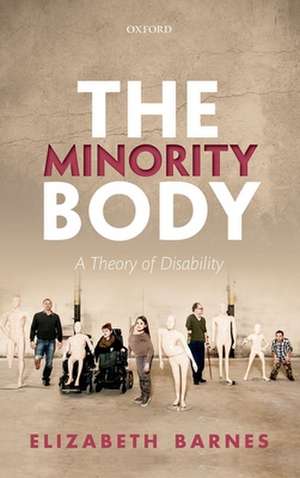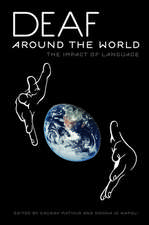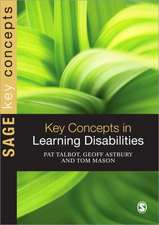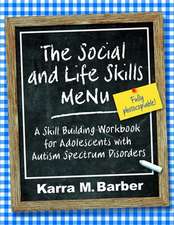The Minority Body: A Theory of Disability: Studies in Feminist Philosophy Series
Autor Elizabeth Barnesen Limba Engleză Hardback – 7 apr 2016
| Toate formatele și edițiile | Preț | Express |
|---|---|---|
| Paperback (1) | 90.43 lei 10-17 zile | +22.33 lei 6-12 zile |
| OUP OXFORD – 8 noi 2018 | 90.43 lei 10-17 zile | +22.33 lei 6-12 zile |
| Hardback (1) | 295.21 lei 31-38 zile | |
| OUP OXFORD – 7 apr 2016 | 295.21 lei 31-38 zile |
Preț: 295.21 lei
Preț vechi: 344.04 lei
-14% Nou
Puncte Express: 443
Preț estimativ în valută:
56.49€ • 58.98$ • 46.75£
56.49€ • 58.98$ • 46.75£
Carte tipărită la comandă
Livrare economică 24-31 martie
Preluare comenzi: 021 569.72.76
Specificații
ISBN-13: 9780198732587
ISBN-10: 0198732589
Pagini: 214
Dimensiuni: 142 x 221 x 17 mm
Greutate: 0.38 kg
Editura: OUP OXFORD
Colecția OUP Oxford
Seria Studies in Feminist Philosophy Series
Locul publicării:Oxford, United Kingdom
ISBN-10: 0198732589
Pagini: 214
Dimensiuni: 142 x 221 x 17 mm
Greutate: 0.38 kg
Editura: OUP OXFORD
Colecția OUP Oxford
Seria Studies in Feminist Philosophy Series
Locul publicării:Oxford, United Kingdom
Recenzii
I am happy to unequivocally say that this text makes a fascinating and groundbreaking contribution to feminist and disability philosophy. I would enthusiastically recommend this text to anyone interested in disability and philosophy, and especially to those new to philosophy.
Elizabeth Barnes' new book offers a much-needed philosophical discussion of disability capitalizing on relevant research in bioethics, feminist philosophy and disability studies.
Elizabeth Barnes has written an interesting and important book about disability. ... Barnes has brought a new level of precision to a popular slogan and has then set about defending it with all the familiar tools of contemporary analytic philosophy. ... it remains to be seen where the debate goes next, but wherever it goes, future discussion will need to engage with the work of Elizabeth Barnes.
It is a thoughtful, thorough, and rigorous argument that nevertheless has an accessible style. It is not a book for a generalist audience, but could work quite readily in both undergraduate and graduate courses. Her attempt to moderate a path between the physical body and social constructivism, and to combat a generalized skepticism in the field of philosophy about the possibility that disability might be a good thing for some people, or at least a neutral thing, that lives of disabled persons are generally as rich, valuable, and worth living as those of nondisabled persons, and that such skepticism is "rooted in--often knee-jerk unreflective--stereotypes about what disabled lives are like" is an unapologetic and strong case for disability positivity. It is a valuable contribution to disability philosophy in particular, and philosophy in general.
The Minority Body is a fascinating and compelling study of the concept of disability. Barnes redefines disability as a social phenomenon in a fresh way. Her revolutionary ideas compel us to look at the minority body without making value-judgments.
In her engaging, powerfully argued, and good-humored book, Barnes seeks to illuminate the nature of physical disability, challenge the view that it has a negative impact on well-being, and defend a mere-difference view of disability ... It is a wildly creative, rigorous, and ground-breaking work that represents a significant contribution to the on-going inquiry into the nature and value of disability. It would not be an exaggeration to claim that it is the most important single-authored book in philosophy of disability to come out of the analytic tradition in a generation.
Elizabeth Barnes' new book offers a much-needed philosophical discussion of disability capitalizing on relevant research in bioethics, feminist philosophy and disability studies.
Elizabeth Barnes has written an interesting and important book about disability. ... Barnes has brought a new level of precision to a popular slogan and has then set about defending it with all the familiar tools of contemporary analytic philosophy. ... it remains to be seen where the debate goes next, but wherever it goes, future discussion will need to engage with the work of Elizabeth Barnes.
It is a thoughtful, thorough, and rigorous argument that nevertheless has an accessible style. It is not a book for a generalist audience, but could work quite readily in both undergraduate and graduate courses. Her attempt to moderate a path between the physical body and social constructivism, and to combat a generalized skepticism in the field of philosophy about the possibility that disability might be a good thing for some people, or at least a neutral thing, that lives of disabled persons are generally as rich, valuable, and worth living as those of nondisabled persons, and that such skepticism is "rooted in--often knee-jerk unreflective--stereotypes about what disabled lives are like" is an unapologetic and strong case for disability positivity. It is a valuable contribution to disability philosophy in particular, and philosophy in general.
The Minority Body is a fascinating and compelling study of the concept of disability. Barnes redefines disability as a social phenomenon in a fresh way. Her revolutionary ideas compel us to look at the minority body without making value-judgments.
In her engaging, powerfully argued, and good-humored book, Barnes seeks to illuminate the nature of physical disability, challenge the view that it has a negative impact on well-being, and defend a mere-difference view of disability ... It is a wildly creative, rigorous, and ground-breaking work that represents a significant contribution to the on-going inquiry into the nature and value of disability. It would not be an exaggeration to claim that it is the most important single-authored book in philosophy of disability to come out of the analytic tradition in a generation.
Notă biografică
Elizabeth Barnes is Associate Professor of Philosophy at the University of Virginia. She works on metaphysics, ethics, and social and feminist philosophy--and is especially interested in the places where these areas overlap.













